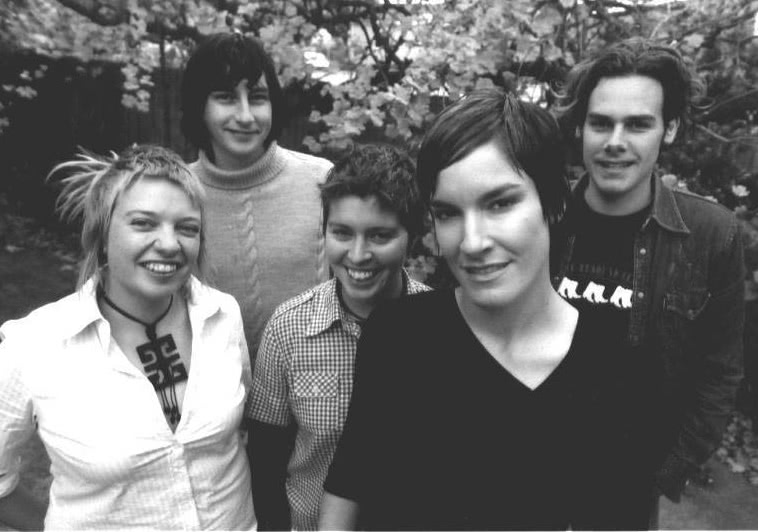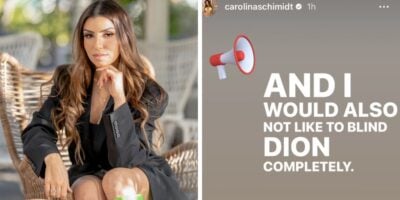Some 13 years ago, Jen Sholakis was sitting in her front room, practising the drums.
She hadn’t grown up in a particularly musical family – when she was young, the radio was mostly dominated by mainstream names like Bob Seger and ABBA, and her overwhelming musical love was for a Smurfs record, Father Abraham In Smurfland. As a result, it hadn’t been exactly easy for her to convince her family that playing the skins was a suitable hobby.
“I wanted to play drums forever,” Sholakis says now, “especially after seeing Animal from The Muppets. But my parents didn’t want to get me a kit. So after lots of family arguments, at around 12 years old, I settled for guitar.”
Indeed, though Sholakis bought herself a drumkit aged 23, as she began to make a name for herself in the early ’00s, most knew her as a guitarist rather than a drummer. Most, it should be stressed, but not all: Julien Poulsen, a local musician, often heard Sholakis practising the drums in her front room. He lived only a few doors up on Jackson Street, St. Kilda, an area bursting at the seams with local talent. “All those legendary rockdogs lived around there,” Sholakis says. “They’d kick the footy in the street and stuff.”
Another one of the locals, and a mutual friend of Poulsen’s, was Jen Cloher. Cloher, a burgeoning singer-songwriter, had moved to Melbourne only a few years before, and was keen to integrate herself into the music scene. “I didn’t know a single soul, let alone anyone in the music community,” Cloher says.
“So I would ride my bike around and go to heaps of shows on my own. That’s how I discovered Mia Dyson, Sodastream, Art of Fighting and loads of other bands that I became a big fan of. Because I didn’t know anyone, all I did was work at a bottleshop, go see bands, read books and write songs.”
Jen Cloher.
As Cloher met more and more musicians, the tunes she was writing – dense, powerful folk numbers – began to expand and take shape. She started recording demos with Poulsen, and lining up shows. Although, before long, she hit a snag: she was lacking a drummer. Luckily, Poulsen knew just the muso to ask.
“Julien literally came over, knocked on my door and asked if I was interested in playing a show,” Sholakis says now of that front room meeting over a decade ago. “I had never played a show on drums before and so was a bit freaked, but played it cool. [Then] Jen called me and came over for a rehearsal and we got drunk and played for hours. We just clicked and it all kinda flowed on from there.”
Before long, the other players started to slot into place. “I met our violinist Andrea Sumner at a party,” Cloher says. “It just ended up with the two of us sitting in her car in the wee hours drinking vodka and reminiscing about growing up in Adelaide.”
Not long after that, bassist Geoffrey Dunbar came into the fold, followed eventually by guitarist Michael Hubbard, who Sholakis had met when they were both working at the Maton guitar factory. “When we were looking for a guitarist Sholakis recommended Michael,” Cloher says. “He turned up to rehearsal one day, played like a legend and the band was complete.”
But what to call themselves? When the answer came, it was from a perhaps unexpected source: the band’s moniker was provided by arch troublemaker and chief stooge himself, Iggy Pop. “The name The Endless Sea comes from an Iggy Pop song,” Cloher says. “It’s on his album New Values … It’s on the Dogs In Space soundtrack too. I heard it for the first time when I was 14 and I thought Iggy was singing “the Embassy” [rather than the ‘endless sea’]. I thought it was a song about spies.”
–
Before long, the band began work on material together in earnest, preparing to record their debut album. Cloher had already sketched out some songs, a brace of them inspired by the books she had pored over when she first moved to Melbourne: the melancholy ‘Rain’ is based on a Raymond Carver short story, while ‘Carol’ took its inspiration from Patricia Highsmith’s The Price Of Salt.
But others still were written over the band’s extensive pre-recording process; tunes crafted slowly, carefully, and long before the group hit the studio. “Jen is a big fan of being prepared,” Sholakis says. “I think we played as a band for about a year before [anything] was recorded.”
Cloher argues part of the reason for such lengthy preparation came down to a question of economics: simply put, recording studios are expensive, and it was important that the band had an inherent sense of trust in one another before they launched into committing anything to tape.
“We recorded the album over four days at Sing Sing in Richmond,” Cloher says. “It’s one of the best live rooms in Melbourne and it’s expensive to hire, so we decided to get in there and go hard over a couple of days because I didn’t have much money. I think it was a good decision in the end. None of us had really been in a proper studio before so it took the pressure off. Playing live together felt natural.”
The solid 12 months the group had spent honing their crafts also gave them the security to improvise, and, though some songs were delicately constructed, others were composed almost ad hoc. “The song ‘Dead Wood Falls’ was written one night in the studio,” Cloher explains.
“I had the lyrics and the guitar part but I had never shown it to the band. One night after a few red wines – maybe a few too many: I liked a drink back then – I started playing the song in the studio and the band walked in and started playing along.
“Because we were recording live to tape, our engineer pushed record and we had the take about ten minutes later. I think it’s one of my favourite songs on the album, because you can hear the band listening to each other to work out the next change. I love it when the studio fairy pays a visit.”
Certainly, the work of the ‘studio fairy’ can be heard all across the songs that would eventually make up Dead Wood Falls, the group’s first record. Cloher left certain things unstructured, in the process encouraging surprises to crop up during the rigid schedule of recording. It’s a trick that she relies on to this day. “All of the vocals are live takes where I’m playing guitar and singing with the band,” Cloher explains. “I’m so glad we did it this way. I’ve pretty much recorded all of my albums like that since because I think you get the best results. Nothing feels forced or manufactured or too perfect.”
Indeed, the pleasures of Dead Wood Falls are derived largely from that selfsame tension between the grandiose and grit, between the beguiling surface of a song like ‘Peaks And Valleys’ and the tune’s essential underlying tension. For music critic Gareth Ware, a noted fan of the record, such masterful interplay speaks of a maturity well beyond the group’s then limited experience.
“What’s striking is [Dead Wood Falls] doesn’t sound like someone making their first album,” Ware says. “Most people in that situation go in with a sense of self-doubt and start second-guessing themselves, but on Dead Wood Falls there’s an assuredness and a sense that someone’s gone into the studio confident of their own abilities and with a clear vision of what they want to achieve.
“It’s an album that uses relatively simple arrangements which puts the focus onto the songwriting,” he continues. “There’d simply be nowhere for the songs to hide if they didn’t work, and it makes the album as a whole more arresting as a result. It feels more like an album made by someone in the stage of their career that Jen is in now.”
Unsurprisingly given that maturity, upon initial release, Dead Wood Falls was enthusiastically received by both critics and audiences. Indeed, the record was so warmly accepted that some of the group’s members found themselves a bit taken aback. “I’d never been in a proper band, with a proper record, that got radio airplay before,” Sholakis explains. “Everything was a surprise for me, because I was so green. Turning up to a sold out single launch at the Corner hotel was a bit overwhelming.”
Before long, it became clear that Dead Wood Falls was the kind of record that people were willing to draw deep into their inner lives: the kind of record fans memorised every word of, tracing every contour. Simply put, Dead Wood Falls means something to people. Dead Wood Falls has weight. So carefully structured is the listening experience that choosing a highlight from the album comes with its own difficulties. “Choosing an individual track is quite hard,” says Ware. “I think of it more as an overarching song cycle or single entity than anything else.”
Even the band run into the same problem when selecting a high point, although Cloher speaks of a deep fondness for ‘Rain’. “It has stood the test of time,” she says. “I still play it live ten years later.” Certainly, that song does definitely have its own Rosetta Stone quality: it contains traces of everything that Cloher has done since, from the trembling humanity of Hidden Hands to the knockout punch of In Blood Memory.
Ultimately, for Ware, someone who has followed Cloher’s career carefully, the songs on Dead Wood Falls set the groundwork for everything singer has done since. “I’d argue her development has been one of evolution rather than revolution,” Ware explains. “Dead Wood Falls set the bar impressively high to begin with, marking her out as one of the country’s sharpest raconteurs. Jen’s songs have revolved around relationships, be they familial or romantic, and that has remained a constant. The songwriting has [been] sharpened with experience.”
–
It’s been ten years since Dead Wood Falls came out. Ten years is a long time, but even if people change, songs don’t. This year, marking their first showing as a complete band since their hiatus in 2010, The Endless Sea are reforming to play Dead Wood Falls in its entirety. It’s a series of shows that will give Cloher and the gang a chance to once more play the tunes that launched their careers: one that Cloher looks forward to tremendously.
“My time with The Endless Sea is very close to my heart,” she says. “I released my first album and went on my first ever national tour with them. We probably did about eight national tours over the six years we were together as a band, a lot of it spent driving and staying in shitty family hotel rooms. It was stressful: I’ve always been independent and self-managed. But it was fun too. You form a rare bond when you spend time with people on the road.”
Though Sholakis has a different way of putting it, the sentiment remains exactly the same: The Endless Sea aren’t just a band. They are more than that. “We all spent so much time together and became really close,” Sholakis says. “So there’s a lot of love there still. Somehow. Even after living in each other’s pockets for years, I still seem to like those arseholes.”
Jen Cloher And The Endless Sea will play the Newtown Social Club, Sydney, on Friday October 14. For more information, check out the Newtown Social Club website, here.
Header image by Alison Shirley.




































